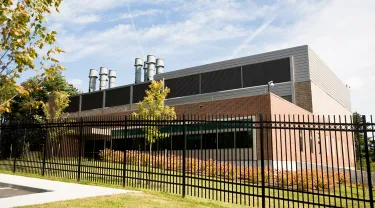The unassuming exterior belies the critical research taking place inside the New England Regional Biosafety Laboratory (RBL), a level-three biosafety facility in Grafton, Massachusetts, that safely allows for research of highly contagious microorganisms.
The National Institutes of Health (NIH) selected Tufts University as one of 12 sites across the United States to house one of these special laboratories, which were mandated by Congress in the aftermath of the terrorist attacks on September 11, 2001. The original intent was for the laboratories to focus on responding to bioterrorism, such as the anthrax attacks that occurred that same year. However, many of the labs have since evolved into researching emerging and reemerging infectious diseases.
During the COVID-19 pandemic, for example, the RBL—along with others around the country—became the front lines of the U.S. response.
Now, it’s living up to its full potential as a site for cutting-edge infectious disease research focused on the health of humans and animals alike. The facility is “a bustling hub,” according to Saul Tzipori, distinguished professor and Agnes Varis University Chair in Science and Society at Cummings School of Veterinary Medicine, who spearheaded the effort to establish an RBL at Tufts. It’s now full of scientists from Cummings School and third-party companies that rent lab space in the facility. The companies are major research organizations involved in a range of activities, including those related to SARS-CoV-2.
In the RBL labs, work with live infectious agents is conducted in a biosafety cabinet designed to contain viruses and bacteria in that space. Lab spaces are under negative air pressure relative to the hallways, and pressure sensors feed data continuously to a building automation system. Alarms go off if there are any issues with negative air pressure, at which point work is stopped and the problem is promptly identified and resolved.
An invaluable resource, the RBL allows both Tufts scientists and the outside companies that work there to do unique types of research on infectious disease, such as examining samples from birds and seals that transmit and carry influenza. From that research, they can begin to develop treatment and prevention strategies for diseases that cause deaths across the globe, including influenza, COVID-19, and tuberculosis.
